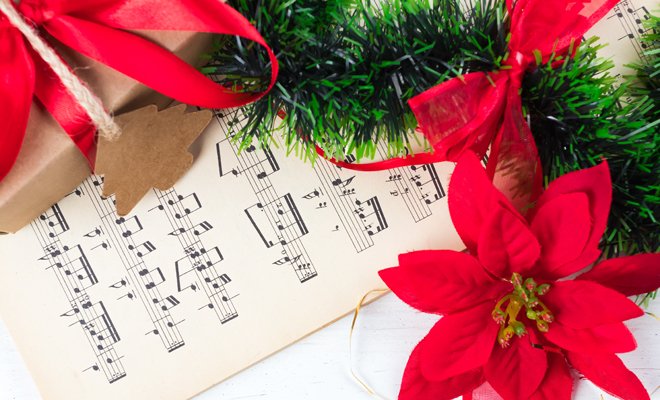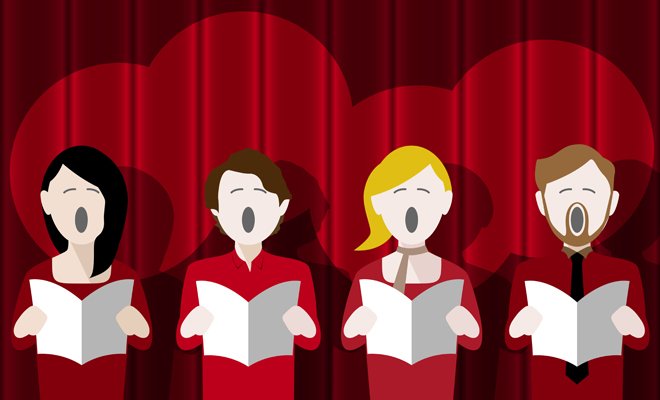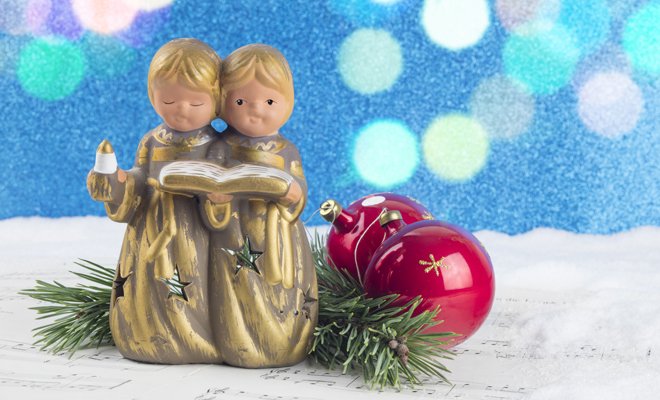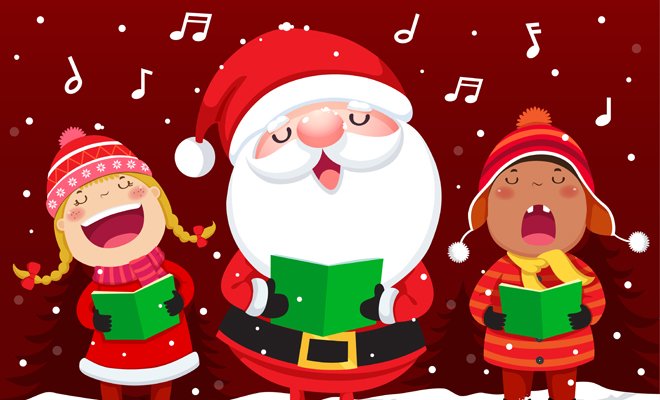Christmas carols in French with lyrics and Spanish translation
When we hear or come to mind the word Christmas carols, we immediately connect with Christmas, family, endearing moments, laughter… And the fact is that the Christmas season is perfect for strengthening ties and spending unforgettable days with our loved ones, days that will remain always in our memory.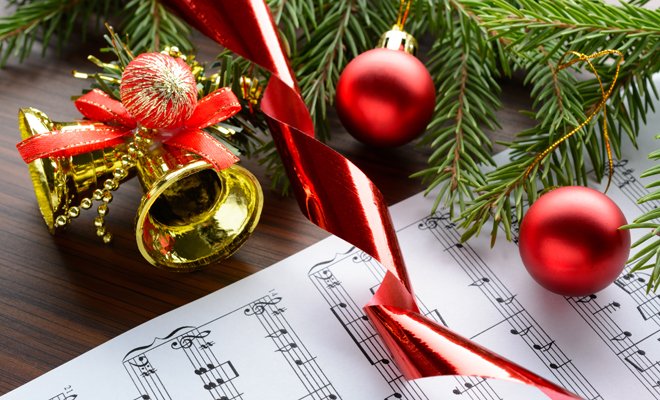
One of the memories we can build is playing and singing Christmas carols with the whole family. Thus, when the little ones get older they will be able to remember them and continue the tradition. However, we no longer need to play and sing the most traditional of all times: Bell on bell, Silent Night… If you want to dare with something more fun or rather “globalized”, we are going to teach you a few Christmas carols in French so you can interpret with your family.
Although it is true that in France French Christmas carols are not usually interpreted as much and are thrown more by the English ones of a lifetime, there are versions of some of them in the language of the country and below we leave you some of them with their corresponding letters and their translation into Spanish in case you are interested in knowing in detail what they mean. To sing!
The 4 most famous and beautiful Christmas carols in France
- Rodolphe, le renne au nez rouge (Rudolf the red-nosed reindeer)
Christmas has really famous characters: The Three Kings, Santa Claus or the well-known red-nosed reindeer, Rudolf. This Christmas carol in French talks about him and also about his nose from him. It was recorded in 1949 and has continued to play ever since.
Lyrics:
- On l’appelait nez rouge
- Ah comme il était mignon
- Le p’tit renenne au nez rouge
- Rouge like a light.
- Son p’tit nez faisait rire
- Chacun s’en moquait beaucoup
- On allait jusqu’à dire
- Qu’il aimait boire un p’tit coup.
- Une fée qui l’entendit
- Pleurer dans le noir
- for comfort
- Lui dit: come to paradise ce soir.
- Like an angel au nez
- Rouge you will drive in the sky
- Avec ton p’tit nez rouge
- Le chariot du Père Noël.
- On l’appelait Nez Rouge
- Ah comme il était mignon
- Le p’tit renenne au nez rouge
- Rouge eats a lumignon (Encore).
- Vous fillettes et garçons
- pour la grande nuit
- If you save your leçons
- Des que sonnera minuit.
- Maintenant qu’il entraîne
- They are char à travers les cieux
- C’est lui le roi des rennes
- Et son nez fait des envieux.
- Ce petit point qui bouge
- Ainsi qu’une étoile au ciel
- C’est le nez de nez rouge
- Announcement of Christmas
- Annonçant le père noël.
- Spanish translation:
- it was called red nose
- oh how cute it was
- The little red-nosed reindeer
- red as a tealight
- His little nose was laughing
- They all didn’t care much
- We went as far as to say
- that he liked to drink a little
- A fairy who heard him
- crying in the dark
- to comfort him
- He said: come to paradise tonight
- like an angel on the nose
- Red you will drive in the sky
- with your little red nose
- santa carriage
- it was called red nose
- oh how cute it was
- The little red-nosed reindeer
- Red as a candle (Bis)
- you girls and boys
- for the big night
- If you know your lessons
- As soon as midnight strikes
- now that he trains
- His chariot through the skies
- He is the king of reindeer
- And his nose is envious
- This little dot that moves
- And a star in the sky
- It’s the red nose
- Announcing Santa Claus
- Announcing Santa Claus
- Petit Papa Noël (Little Santa Claus)
On the night of December 24, Santa Claus visits all the houses of the children who are sleeping and who have left some shoes and a glass of milk for him. This Christmas carol speaks of this tradition and was recorded by the French singer Tino Rossi in 1946, for the film “Destins”. We leave you the lyrics!
Lyrics:
- C’est la belle nuit de Noël,
- La neige étend son manteau blanc,
- Et les yeux levés vers le ciel,
- à genoux, les petits enfants,
- Avant de fermer les paupières,
- Font une dernière prière.
- little santa claus
- When you will descend from heaven,
- Avec des jouets par milliers,
- N’oublie pa’s mon petit soulier.
- More before leaving,
- Il faudra bien couvrir te,
- Dehors you will avoir si froid,
- C’est un peu à cause de moi.
- It takes me so long that the day is gone
- Pour voir si tu m’as contributed,
- Tous les beaux joujoux que me vois en rêve
- Et que je t’ai commandés.
- little santa claus
- When you will descend from heaven,
- Avec des jouets par milliers,
- N’oublie pa’s mon petit soulier.
- Le marchand de sable est passé
- Les enfants vont faire dodo
- And you will be able to start
- Avec ta hotte sur le dos
- Au son des cloches des églises
- The distribution of surprises
- little santa claus
- When you will descend from heaven,
- Avec des jouets par milliers,
- N’oublie pa’s mon petit soulier.
- If you do t’arrêter
- Sur les toits du monde entier
- Tout ça avant demain matin,
- Mets-toi vite, vite en chemin.
- And when you will be sur ton beau nuage,
- Winds of abord sur notre maison
- Je n’ai pas été tous les jours bien sage,
- Mais j’en demand pardon.
- little santa claus
- When you will descend from heaven,
- Avec des jouets par milliers,
- No oublie pa’s mon petit soulier,
- Little Santa Claus.
Spanish translation:
- The snow spreads its white coat,
- And eyes raised to heaven
- kneeling, little children,
- Before closing the eyelids,
- Say one last sentence.
- little santa claus
- When you come down from heaven
- With thousands of toys,
- Don’t forget my little shoe.
- But before leaving
- It will be necessary to cover it well,
- outside you will be so cold
- It’s a bit my fault.
- I can’t wait until dawn
- Let’s see if you brought me
- All the beautiful toys I see in my dreams.
- And that I ordered you.
- little santa claus
- When you come down from heaven
- With thousands of toys,
- Don’t forget my little shoe.
- The sandman has passed
- The children go to sleep
- and you can start
- With your hood on your back
- To the sound of the church bells
- Your distribution of surprises
- little santa claus
- When you come down from heaven
- With thousands of toys,
- Don’t forget my little shoe.
- if you have to stop
- On the rooftops of the whole world
- All this before tomorrow morning
- Get up fast, fast on the road.
- And when you’re on your beautiful cloud,
- first in our house
- I haven’t been very good every day
- But I beg your pardon.
- little santa claus
- When you come down from heaven
- With thousands of toys,
- Don’t forget my little shoe
- Little Santa Claus.
- La marche des Rois (The March of the Kings)
One of the most anticipated days of Christmas, without a doubt, is the night of the Three Kings. That night when all the children look forward to going to sleep early to wake up the next day with gifts under the tree and sweets in their shoes. About this “event” there are several Christmas carols, among them, The March of the Kings.
Different versions have been made, its French variant dates from 1894 and tells of a traveler who observes three kings traveling on a train, following a star and carrying gold, frankincense and myrrh to offer the newly born child.
Lyrics:
- Good morning,
- J’ai rencontré le train
- De trois grands Rois qui allaient en voyage,
- Good morning,
- J’ai rencontré le train
- De trois grands Rois dessus le grand chemin.
- Venaient d’abord les gardes du corps,
- Des gens armés avec trente petits pages,
- Venaient d’abord les gardes du corps
- Des gens armés dessus leurs just’au corps.
- Puis sur un char,
- Doré de toute part,
- On voittrois rois modestes comme d’anges
- Puis sur un char,
- Doré de toute part
- Three red debuts for the standards.
- L’étoile luit
- Et les Rois conduit,
- Par longs paths,
- Devant une pauvre étable,
- L’étoile luit
- Et les Rois conduit,
- Par longs chemins devant l’humble reduit.
- Au fils de Dieu
- Qui naquit en ce lieu
- Ils viennet tous presenter leurs hommages,
- Au fils de Dieu
- Qui naquit en ce lieu
- Ils viennet tous presenter leurs doux vœux.
- Of beaux presents,
- Or, myrrhe et encens
- Ils vont offerrir au maitre tant admirable
- Of beaux presents,
- Or, myrrhe et encens
- Ils vont offerrir au bienheureux enfant.
- Spanish translation:
- Good morning
- I met the train
- Of three great kings who went on a journey,
- Good morning
- I met the train
- Of three great kings on the high road.
- First came the bodyguards,
- People armed with thirty little pages,
- First came the bodyguards
- Armed people in their bodies.
- Then in a tank
- gold all around
- We see three kings humble as angels
- Then in a tank
- gold all around
- Three kings standing between the standards.
- The star shines
- And the Kings lead,
- for long roads,
- In front of a poor stable,
- The star shines
- And the Kings lead,
- For long roads before the humble reduction.
- to the son of god
- who was born in this place
- They all come to pay their respects,
- to the son of god
- who was born in this place
- Everyone comes to offer their sweet wishes.
- beautiful gifts,
- Gold, myrrh and incense.
- They will offer the teacher so admirable
- beautiful gifts,
- Gold, myrrh and incense.
- They will offer the blessed child.
- Il est né le divin enfant (The divine child is born)
It is one of the most popular French Christmas songs because the melody is very characteristic. It is part of the Christian tradition because it tells and remembers the birth of the baby Jesus. It was first published in 1874.
Lyrics:
- Il est ne le Divin Enfant
- Jouez haut-bois, resonez musettes.
- Il est ne le Divin Enfant,
- Chantons tous son avènement.
- After more than four thousand years,
- We promise the Prophetes,
- After more than four thousand years,
- Nous attendions cet heureux temps.
- Oh! qu’il est beau, qu’il est charmant!
- Oh! que ses grâces de él sont parfaites!
- Oh! qu’il est beau, qu’il est charmant!
- Qu’il est doux ce divin enfant.
- Une étable est son logement,
- A peu de paille est sa couchette,
- Une étable est son logement
- Pour un Dieu quel abaissement!
- Partez grands rois de l’Orient,
- Come join our parties!
- Partez grands rois de l’Orient,
- Venez adorez cet enfant.
- I see our hearts, I attend them,
- Il naît pour faire leur conquête,
- I see our hearts, I attend them,
- Donnons-les lui donc promptement.
- Ô Jésus, ô Roi tout puissant,
- Tout petit enfant que vous êtes!
- Ô Jésus, ô Roi tout puissant,
- Régnez sur nous entièrement.
Spanish translation:
- The divine child was born
- Play the oboe, let the bells ring out.
- The Divine Child was born,
- let us all sing his advent.
- For more than four thousand years,
- We promised the prophets,
- For more than four thousand years,
- We were waiting for this happy moment.
- oh! How beautiful it is, how charming it is!
- oh! That his graces are perfect!
- oh! How beautiful it is, how charming it is!
- How sweet is this divine child?
- A stable is your home,
- A bit of straw is his bunk,
- A stable is your home
- My God, how low!
- Come great kings of the East,
- Join us at our parties!
- Come great kings of the East,
- Come and adore this child.
- He wants our hearts, he waits for them,
- He is born to conquer
- He wants our hearts, he waits for them,
- Let’s give it to him right away.
- O Jesus, O Almighty King,
- Every little child you are!
- O Jesus, O Almighty King,
- Rule over us completely.


